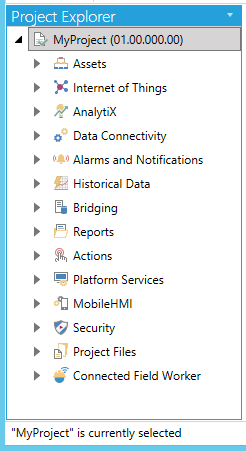Tools and Providers
GENESIS64's Workbench can save all of your tools, application providers, and settings with your projects in their project files so that you can reopen and reuse the project easily.
A project is typically stored where the servers are running but, in actuality, several servers may need to be accessed in order to run the different displays at an enterprise. As long as you have defined the servers' connections, those connections are stored with the project, too.
Centralized security allows all GENESIS64 operations to be secured, which can be adopted by OEM customers. Security Server limits access permissions to projects and plug-in, including file access to create, modify, or read only. Historical data are secured with an audit trail. It also allows you to secure OEM operations. For more information, refer to Security.
The Workbench is designed for concurrent configuration by multiple development team members over the internet. It follows the optimistic concurrency model; there are no database locks. Multiple application servers and databases can be configured simultaneously. An additional ICONICS Workbench Toolkit can also be used, to create plug-in from third-party and OEM content providers.
Providers in the Workbench
Development and Runtime modes of all installed and licensed ICONICS GENESIS64 products can be accessed and used in the Workbench.
Even though the following providers are available in the Workbench, you can pick and choose which providers appear in the Workbench's Project Explorer, as shown in the figure below.
Workbench Project Explorer Showing Top Level of Providers

Workbench Providers include:
Data Connectivity
Alarms and Notifications
Historical Data
Actions
Platform Services
- FrameWorX
- Global Aliasing
- Language Aliasing
- Recipes (RecipeWorX64)
- Unified Data Manager
- Web API
- MobileHMI
- Security
Project Files
Working with Services
A number of GENESIS64 components are servers or services that you can control and modify within the Workbench. A few examples include:
-
AlarmWorX Server starts and stops the alarm server, as well as provides a configuration interface to configure alarms.
-
Global Aliasing System (GAS) stores variable names and their values within an SQL database so that these variables can be used throughout GENESIS64 applications. Start, stop, create, and modify global aliases using this interface.
-
Language Aliasing System (LAS) makes substitutions for language aliases whenever the assigned language in the Language Selector dialog box is changed.
-
Unified Data Manager (UDM) is a central location for storing expressions, subscriptions, groups, values, registers, triggers, and other data that can be used by any GENESIS64 application. The service can be started, stopped, and all of these data types and data instances can be created and modified within the UDM in the Workbench.
See Also: